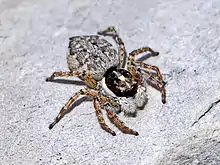Menemerus semilimbatus
Menemerus semilimbatus is a spider in the family Salticidae.[1]
| Menemerus semilimbatus | |
|---|---|
 | |
| Scientific classification | |
| Kingdom: | Animalia |
| Phylum: | Arthropoda |
| Subphylum: | Chelicerata |
| Class: | Arachnida |
| Order: | Araneae |
| Infraorder: | Araneomorphae |
| Family: | Salticidae |
| Genus: | Menemerus |
| Species: | M. semilimbatus |
| Binomial name | |
| Menemerus semilimbatus Hahn, 1829 | |
| Synonyms | |
| |
Description
Menemerus semilimbatus are about 6.5–8.4 millimetres (0.26–0.33 in) long, the male being slightly smaller than the female. These fairly big jumping spiders are dorso-ventrally flattened and are covered with short dense, grayish-white hairs, with hairy whitish palps and a white band on the side margins of the carapace, showing also a small white, triangular marking in the middle. The eyes are large and forward-facing. The legs are light brown with darker rings and patches, while the abdomen is dorsally yellowish or grayish, with a characteristic pattern of several bright V-shaped markings. The females show a notch at the posterior edge of the epigyne and two oval depressions in the anterior half.[2][3]
Distribution
Menemerus semilimbatus is a Mediterranean species widely distributed in Europe, southern Asia and in Africa. In the Americas, it has been reported for Argentina, Chile, Ecuador and USA.[2][3][4]
Habitat
These spiders are synanthropic living in gardens and inside and on the outside of houses.[2] It is usually found on the walls of buildings where it stalks its prey.[5]
References
- Biolib
- Andrés Taucare-Rios and G. B. Edwards First records of the jumping spider Menemerus semilimbatus (Araneae:Salticidae) in Chile
- Araneae
- Fauna europaea
- E.F. GUSEINOV Natural prey of the jumping spider Menemerus semilimbatus (Hahn, 1827) (Araneae: Salticidae), with notes on its unusual predatory behaviour Archived 2015-06-22 at the Wayback Machine
External links
| Wikimedia Commons has media related to Menemerus semilimbatus. |
| Wikispecies has information related to Menemerus semilimbatus. |